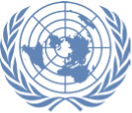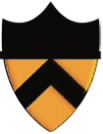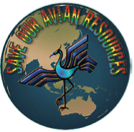Diplomacy Simulation
Sunday, June 20, 2021 at 11:00 AM CDTWe strongly suggest you keep this page open during the simulation!
Freshwater Crisis
Energy Security and Economic Growth
This simulation involves a hypothetical scenario but deals with the real world problem of increasingly scarce freshwater resources. You will role play a member of a delegation at an international meeting trying to negotiate a solution. The delegations are:
- The U.S. Department of State
- The Water Convention Bureau
- The Foreign Ministry of Yeeland
- The Foreign Ministry of Grusa
- Save Our Avian Resources (SOAR)
Yeeland and Grusa are neighboring countries that share a common border (see map). Yeeland is an industrialized country with a medium-sized population. Most people live in urban areas. Grusa is a rural country with a much smaller population. Most people are farmers. Yeeland, Grusa and the United States are economically interdependent. Grusa grows wheat that it sells to Yeeland and the United States. Yeeland manufactures farming equipment that it sells to Grusa and the United States. All three countries are members of the United Nations.
The Convention on the Protection and Use of Transboundary Watercourses and International Lakes (the Water Convention) is a legally binding international treaty (agreement) that any country belonging to the United Nations can join.
We highly recommend keeping this page open for the duration of the diplomacy simulation! This page is a step-by-step guide to completing the simulation successfully. It contains many helpful resources and tools to help you along the way.
1. The Simulation Begins
11:00 AM CDT – 20 minutes
The simulation begins promptly at 11:00 AM CDT with an all-delegate briefing. It is here that we will go over the simulation details.
Click Here to Join this Zoom Session.
Meeting ID: 823 0075 0445
Password: 779718
2. To the Simulation Room!
11:20 AM CDT – 10 minutes
After the briefing is complete, you will have 10 minutes to move to your assigned simulation room. These are the same room as your assigned Small Group Rooms. Move quickly! The simulation begins promptly at 11:30 AM CDT. If you have extra time prior to 11:30, use the time to ask questions.
If you do not have or remember your assigned small group (from the Opening Session), please select one group from below to join.
3. Stakeholder Meetings
11:30 PM CDT – 15 minutes
At the start of the simulation, you will be assigned into your stakeholder groups, one of the following:
- The U.S. Department of State
- The Water Convention Bureau
- The Foreign Ministry of Yeeland
- The Foreign Ministry of Grusa
- Save Our Avian Resources (SOAR)
As soon as you have received your assignment, click on the corresponding Stakeholder Group image (below) to learn more information about who you are representing. You will want to discuss this information quickly with your group.
Click on your assigned Stakeholder below to download your Fact Sheet
(We discourage you from viewing other Stakeholders’ Fact Sheets. Please do not download or view the Fact Sheets for Stakeholders which you are not assigned until after the simulation is complete. Thank you!)
Once you have read your Stakeholder’s position statement, begin developing your opening statement. You will want to assign a spokesperson for your group, to act as official representative/speaker for your group in the upcoming sessions.
Questions to think through:
- Whom do you represent?
- What is your overall goal?
- What goals (in priority order) would you also like to achieve?
- What are you willing to compromise? Always have something that you are willing to give up to help the negotiation process achieve something.
- Who can help you?
- Who might oppose your approach?
- What incentives/disincentives can you offer to persuade others?
- What is your strategy in dealing with other parties? With whom should you speak first?
4. Opening Statements
11:45 AM CDT – 15 minutes
To begin the simulation, each stakeholder group will in turn deliver its opening statement. The stakeholder group that called the meeting within the scenario speaks first, followed by the other groups in no set order. Opening statements should be short, only about one-to-three minutes. All stakeholders should listen closely to each group. No questions or discussions will take place during this time.
5. Stakeholder Groups Reconvene
12:00 PM CDT – 10 minutes
After opening statements are delivered, your stakeholder group will reconeve to develop a plan of action. What do you want to do? What actions need to be taken? What resources do you have? Which partners will you seek out first? On what timeline does these things need to be accomplished? Pose questions and express initial reactions to the solutions proposed. Delegates should take notes during the discussion. Briefly summarize the current position and what steps you will take during the next round of discussions.
6. Informal Discussion & Negotiation
12:10 PM CDT – 20 minutes
This is where the bulk of your negotiations will take place. Stakeholders should then have discussions with members of other groups within the simulation room. Anyone within a group may address the room, but only one person at a time. Make sure no individual or group dominates the discussion and that no group is left out.
Tools for Negotiating Effectively
Clearly determine your position and agree on your strategy
- Clarify or restate your position if it is misrepresented by one of the other stakeholder groups.
- If during informal discussions you decide your group should change its position, discuss it with your group members as soon as possible.
Realistically evaluate possible actions before you propose them
- Are the proposals possible?
- Will they achieve the results you want?
- Watch for unintended consequences.
Analyze other groups’ positions
- Why do they hold that position?
- Why do they oppose or support your proposals?
- Can you apply pressure to make stakeholders re-evaluate their positions?
- Can you offer any incentives to make stakeholders re-evaluate their positions?
Build alliances
- Identify which stakeholders share your position and which do not.
- Do not spend all your time trying to persuade others. Listen carefully to other delegates and absorb what they are saying.
- Try to identify common interests and concerns you share with other stakeholders.
- Even if your end goal is different, what can you agree on with others?
Incentives and disincentives (“Carrots and Sticks”)
- Consider what incentives you can safely offer to other groups.
- Explain to other stakeholders the negative consequences (either direct or indirect) that may follow if they oppose your position.
7. Stakeholder Group Meeting
12:30 PM CDT – 10 minutes
8. Proposals & Agreements
12:40 PM CDT – 10 minutes
9. Stakeholder Re-Negotiation (optional)
12:50 PM CDT – 5 minutes
10. Final Negotiations (optional)
12:55 PM CDT – 5 minutes
Debrief
If time remains
- What are the roots of the conflict?
- How do politics impact the issue? The economy? The culture?
- What diplomatic solutions were proposed?
- What attitudes were effective or not effective in negotiating a diplomatic solution? What did you learn about the topic?
- What did you learn about the interactions of people in this simulation?
- How did diplomatic skills play a role in this simulation?
- Why is this topic important to consider?
- What do you think the U.S. role should be in this issue?
- What is the best possible outcome?
- What is the most likely outcome?
- How could you use diplomatic skills in your everyday life?






